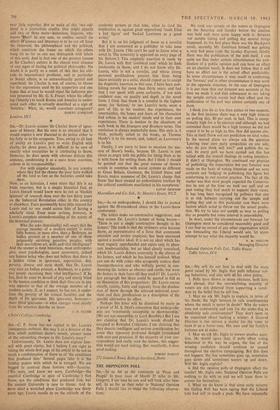SIR,—We will do our best to deal with the main
point raised by Mr. Inglis that polls influence vot- ing behaviour, and also with all his other points.
I. Polls have shown in many elections, both here and abroad, that the overwhelming majority of voters are not deterred from supporting a candi- date by the belief that he will lose.
2. May we ask Mr. Inglis to explain, in terms of his thesis, the high turnout in safe constituencies where the result is never in doubt? Why do voters turn out consistently and vote for the under-dog in absolutely safe consituencies? They don't seem to be concerned about backing a winner. A General Election is too serious a matter for the voter to treat it as a horse race. His own and his family's fortunes are at stake.
3. May we ask Mr. Inglis to answer another ques- tion. He would agree that, if polls affect voting behaviour in the way he argues, the line of the winning candidate should continue to ascend throughout the election campaigning. But this does not happen; the line sometimes goes up, sometimes goes down and sometimes wavers up and down. Will Mr. Inglis explain?
4. Did the opinion polls at Orpington affect the results? Mr. Inglis asks. National Opinion Polls are nothing to do with "us and we will leave them to answer for themselves.
5. What we do know is that since early autumn the Gallup Poll has been saying that the Liberal vote had still to reach a peak. We have repeatedly stressed that Liberals, for their greatest success, needed organisation and publicity to coincide. This happened at Orpington.
6. The current Gallup Political Index report, analysing the March by-elections, shows that Orpington completely fits into this analysis. There is no mystery about it; why drag in polls and their alleged impact to explain a straightforward result?
7. If Mr. Inglis wishes, nevertheless, to maintain his thesis, he must explain how it comes about that the alleged special influence of the polls fitted itself neatly into the classical pattern, of the Conservatives losing to the Liberals two votes for every one that Labour lost to them.
■ 8. Basically, polling and survey research is scientific. Even if other polling organisations choose to claim that they are 'forecasting,' we believe that being scientific implies that polls deal solely in probabilities.
9. Mr. Inglis records that National Opinion Polls made an error of 11 per cent. He asks, 'What went wrong?' Mr. Inglis forgets that a well-known British researcher retired hurt from the polling field after an initial attempt which resulted in an error even greater than NOP's, of more than 13 per cent.
Obviously, Mr. Inglis has been conditioned by the long-sustained accuracy of Gallup Polls over more than twenty years.
10. In survey research, as in another scientific discipline, medicine, it is important to choose the practitioner with extreme care.
Social Surveys (Gallup Poll) Ltd., 211 Regent Street, W I















































 Previous page
Previous page